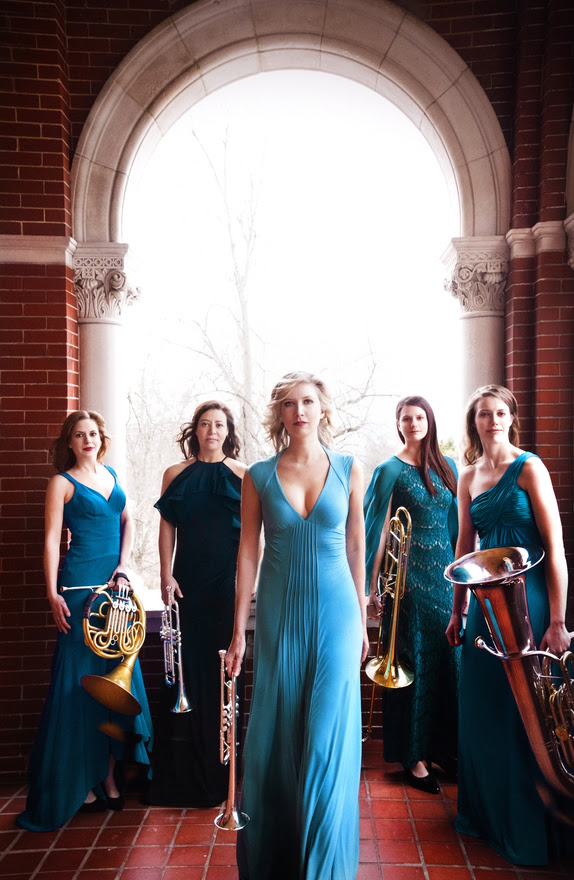By Daniel Hathaway
The second installments of three repeating programs are on the agenda tonight: No Exit’s “Surrealist Games” at Heights Arts at 7, Apollo’s Fire’s “Splendour in London” at Lakewood Methodist at 7:30, and The Cleveland Orchestra’s all-Mahler program featuring baritone Simon Keenlyside at Severance at 7:30.
Also at 7, The Singers Club of Cleveland will present “The Music We Sing” at First Baptist in Shaker Heights, and CityMusic Chamber Series will feature British music at Praxis Fiber Gallery.
And at 7:30, the Oberlin Artist Recital Series will present the all-female Seraph Brass (pictured) in Finney Chapel, featuring a premiere by Jeff Scott.
For details, visit our Concert Listings.
ANNOUNCEMENTS:
Three recent press releases from The Cleveland Orchestra and the Cleveland Museum of Art:
- Centenarian architect Robert Madison was honored on October 12 with the Orchestra’s Distinguished Service Award (read more here),
- the Orchestra’s autograph manuscript of Mahler’s Symphony No. 2 will be on put on display at the Cleveland Museum of Art from October 31 to February 11, 2024 (read more here)
- and on Saturday afternoon November 4, the ensemble will give its first “sensory-friendly” concert designed “for people of any age with autism spectrum disorder or sensory sensitivity, as well as anyone who would benefit from a more relaxed concert environment.” Assistant conductor Daniel Reith will lead Gioachino Rossini’s Overture to William Tell, Modest Mussorgsky’s Pictures at an Exhibition, and John Williams’s Superman March. (more here).
TODAY’S ALMANAC:
German violinist, clarino trumpet player and composer Johann Christoph Pezel departed this life on October 13, 1694, having served as Stadtpfeifer and Stadtmusicus (a member of the municipal wind band) in Leipzig and Bautzen. His music is frequently played these days by modern brass ensembles, but ensembles were more complex in Pezel’s time. As an example, listen to his Sonata Ciacona a 6 in a performance by the Baroque string band ACRONYM here (there’s a score to follow).
In 1912 on this date, Moravian-American composer Hugo Weisgall was born in Ivancice, then part of the Austro-Hungarian Empire. He moved with his family to the U.S. at the age of eight, studying at Peabody and Curtis, and completing a doctorate in German literature at Johns Hopkins — which made him a valuable aide-de-camp to General George S. Patton during World War II.
In addition to his interest in Jewish cantorial music, Weisgall is known for his operas (especially Six Characters in Search of an Author) and extended song cycles, including Soldier Songs. The latter preserves a Wilfred Owen poem Weisgall set after investigating the mistreatment of Germans by Czechs in the hospital at Terezin. Listen here to Six Characters as performed by Chicago’s Lyric Opera Center for American Artists. There don’t seem to be any recordings of Soldier Songs — enterprising baritones, take note!
We’ve previously highlighted English-born violist and composer Rebecca Clarke in the Diary on her birthdate on August 27, when we recommended a CIM video of her Viola Sonata. She died on this date in 1979 in New York City. Watch here another CIM performance, this time of her 1921 Piano Trio by the Hazel Trio (JuEun Lee, violin Richard Li, cello, and Jonathan Mak, piano) from May, 2019.




